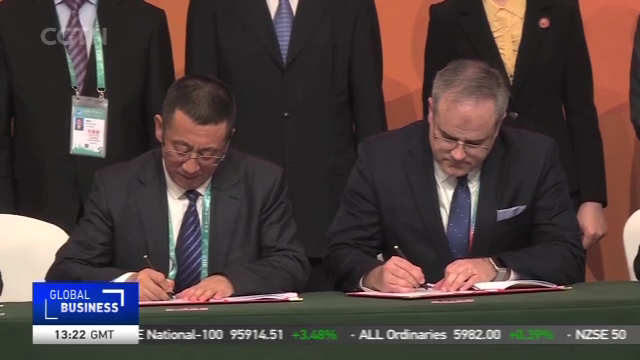
21:54, 07-Nov-2018
CIIE Deals: SOEs sign deals with a range of African firms
Updated
21:21, 10-Nov-2018
03:24

China's agricultural produce imports hit new levels in 2017, with the country accounting for 10% of the global farm produce trade. Trade frictions notwithstanding, the United States has been China's biggest supplier of farm produce for years. Now, however, African countries want a slice of the action. CGTN's Ramah Nyang has been looking at some deals from the CIIE.
The CIIE is all about deals. Among deals to import machinery from the likes of Siemens and GE, the Norinco Group inked a deal to import agricultural produce from firms in Sudan and Ethiopia.
Norinco's not stranger to the continent. It has two mines in Africa's biggest copper producer, giving it access to copper & cobalt. Platinum will be available once a mine in Zimbabwe is completed.
Growing energy demand in China, according to Norinco, is an opportunity to boost LNG exports from Egypt.
LUO KAIQUAN, VICE PRESIDENT CHINA NORTH INDUSTRIES CORPORATION "We hope to invest in natural gas and LNG in Egypt, because now China is also improving its energy structure, so these resources are very important for the Chinese market. We'd like to invest actively if there are some projects, like natural gas, in Egypt."
China took in less than 9% of Ethiopia's total exports in the fiscal year that ended in June, importing merchandise worth just under $ 240m. That was less than Ethiopia's exports to her neighbor to the South East, Somalia, which took in imports worth about $ 270 M. Agricultural produce may hold great promise, but not all produce gets equal tariff treatment.
ASSEFA YOHANNES, DIRECTOR ETHIOPIAN PULSES, OILS, SPICES EXPORTERS ASSOCIATION "We have the tax free access for the Ethiopian export commodities. Exporters can export their products with almost zero tax, but it's only for a few products. Hopefully, other new products will also get this privilege."
RN "Which product enjoys this privilege?"
ASSEFA YOHANNES, DIRECTOR ETHIOPIAN PULSES, OILS, SPICES EXPORTERS ASSOCIATION "Sesame, and green mung beans. Soya bean is also coming to the market, so hopefully it will also get this kind of treatment."
Tariffs aren't the only bottlenecks facing agro-exporters from Ethiopia however. Logistical bottlenecks are a significant constraint.
ASSEFA YOHANNES, DIRECTOR ETHIOPIAN PULSES, OILS, SPICES EXPORTERS ASSOCIATION "It's taking a long time because our products are transported from warehouse in Ethiopia to Djibouti, by truck. The road may not be good enough for the trucks so if we replace this with the railway, hopefully, the time will be shorter."
Fixing the logistics problem is a work in progress, for many an African agro-exporter. Ethiopia, Kenya and Uganda are all investing in rail, but these projects have run into various problems.
Kenya's yet to close $ 3.8 B in funding for the final leg of its rail line. Uganda says it might not finish its side of the line by 2022 as planned. As for the Djibouti-Ethiopia rail line, the firm that insured it, says its lost over $ 1 B on that project.
Make no mistake, the market demand is there, but the means to meet it, that's a work in progress. RN, CGTN, Shanghai.

SITEMAP
Copyright © 2018 CGTN. Beijing ICP prepared NO.16065310-3
Copyright © 2018 CGTN. Beijing ICP prepared NO.16065310-3